| Distributed Computing Tools< /td> |
| Computer Work Calculator is an interactive web page that allows you to estimate the "fair value of a slice of CPU power," estimate the cost of purchasing that amount of power on a commercial distributed computing network, or estimate the soonest possible time that you can execute a given number of instructions for a given amount of money. | ||
| Many add-on tools for SETI@home are listed in the SETI@home FAQ. These include tools to maintain and view logs of work units, display stats about your current work unit in a small Graphical User Interface (GUI), view extended information about SETI@home team statistics, and buffer multiple work units on your system so that you don't need to connect to the SETI@home servers after completing each work unit. | ||

|
COWPump "uses WinAmp's Visualization plug-in to visualize a distributed.net client's performance." | |
|
|
SETI Timer is a web-based tool that allows you to estimate the time it will take for your system to process one SETI@Home data block. | |
|
|
Folding Timer is a web-based tool that allows you to estimate the time it will take for your system to complete one Folding@Home protein folding work unit. | |

|
FoldMonitor
by Denis Hruza is a PerlTk script (or Win32
executable) that graphically monitors
Folding@Home version 2
clients. It also monitors
Genome@Home clients if you run it with a --genome option, and
Distributed Folding clients if you
run it with a --distribfold option. The PerlTk
version requires you to have Perl/Tk installed on your system. It supports
skins and color themes, so you can customize its look. Version 5.1.4 is
available as of May 23, 2002.
Join a FoldMonitor discussion group. |
|
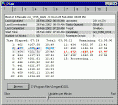
|
DSpy is a Win32 executable that monitors up to ten D2OL and/or Community TSC clients. Version 2.05 of the client is available as of April 16, 2004. This version supports the new protein targets that Community TSC began in January, 2003. | |
|
Google Compute,
a feature of the
Google Toolbar, volunteers your
computer to work on distributed computing projects when it would otherwise
be idle. It currently supports the
Folding@Home project. In the future it will support other projects and
will use your computer to "improve Google and its services." You can enable
and disable this feature of the Google Toolbar at any time, and you can access
your stats for the projects you are contributing to. All Google Compute
volunteers are grouped into the Team Google team for projects that support
teams.
The Google Toolbar requires a Win32 platform with Internet Explorer version 5 or later. It creates a toolbar underneath the Internet Explorer toolbar in Internet Explorer. |
||
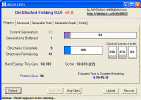
|
Distributed Folding GUI (dfGUI)
provides a graphical way for Windows users to start,
stop, and run the Distributed Folding
client software. It shows you how many structures have been completed in the
current generation, the best energy for the current generation, and an
estimated time for when the block will be completed. It also lets you change
the options used for the Distributed Folding client. Finally, it shows you
statistics and graphs about your previous generations.
The Distributed Folding client is run in a separate DOS window, so you can still watch the ANSI art it creates when it is running. dfGUI also supports running the Distributed Folding client as a service. Version 3.2 of the tool is available for Windows as of October 18, 2003. A version for Linux is available from a third party (see the link on the website). Note that version 3 only supports the Phase 2 Distributed Folding client. Source code for the tool is available from the website. |
|
|
Folding@Home Grapher
"graphs and analyzes
Folding@Home team statistics
over time." "The current functionality includes the ability to download and
store team statistics from the Folding@Home site and display a graph showing
the performance of any subset of teams."
Alpha version 0.0.3 of the tool is available as of November 18, 2002. The tool is currently developed for Linux. See installation instructions for the tool. |
||
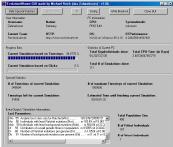
|
evolution@home GUI,
written by Michael Reich of team
Rechenkraft.net, provides a Windows
graphical interface for the semi-automated version of the
evolution@home client.
Version 1.1b of the client is available as of April 11, 2003. |
|
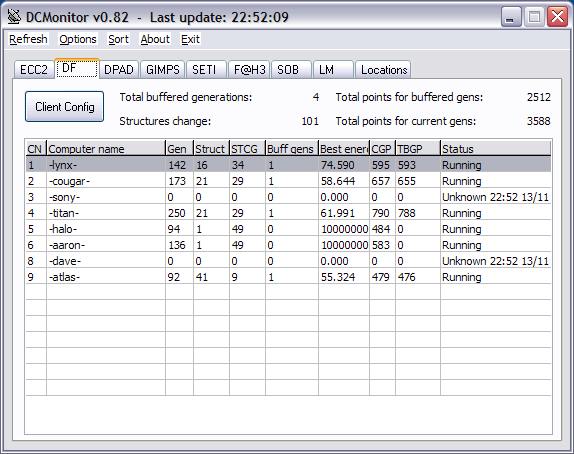
|
DCMonitor, written by Allan Greenwood, monitors multiple clients for the following projects: ECC2-109, Distributed Folding, DPAD, GIMPS, SETI@home, Folding@home, Seventeen or Bust, and Lifemapper. It is useful for people who run multiple clients from multiple projects on a LAN. | |
|
BOINCgui
provides a Linux graphical display of a
BOINC client's status.
Version 0.4 of the client is available as of June 26, 2004. It supports the public release verson of BOINC version 3.18. Many other BOINC monitoring tools are listed in the Downloads section of the SETI@Netherlands team site. |
||

|
D2OL Daddy
"is a Graphical User Interface that sits in your
Windows tray and monitors the
D2OL and
CommunityTSC clients to make
sure their processes are running at the lowest possibly priority. This should
greatly reduce and in many cases entirely eliminate the choppy/slow response
from other software while D2OL/TSC is running on your machine. It will even
monitor and control multiple copies of D2OL/TSC running on the same machine."
Version 1.0 of the client is available as of September 10, 2004. |
|
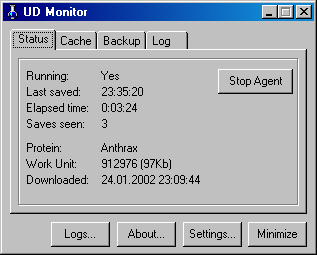
|
UD Monitor
is a utility which allows you to run, monitor, and
cache multiple work units for grid.org
and Folding@home.
Version 4.20 of the client is available as of April 6, 2004. The client source code is available for download. |
|
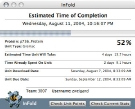
|
InFold
is an AppleScript Studio application that displays
information about your current
Folding@home work unit. It shows
the current progress and estimates when the work unit will be completed and
how long it will take to complete.
The tool also exists in a InFold DP version for dual-processor systems. It tracks two Folding@home clients running on one system. Version 1.2 of the InFold client and InFold DP client is available as of November 19, 2004. |
|

|
FADSpy
monitors your standalone or networked
Find-a-Drug clients.
Version 0.48 beta of the client is available as of November 11, 2004. Source code for the client is available for download. |
|
| Past Distributed Computing Tools | ||
| Top... |